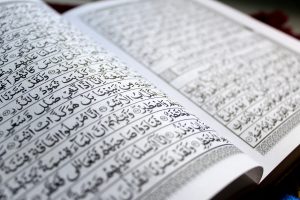“Groom sentenced in Australian-first child bride case.”
“The Koran verse splitting imams on domestic violence.”
“’I’m not his property’: Abused Muslim women denied right to divorce.”
Let’s be honest.
What’s the first thing that comes to mind, when we come across these headlines?
These sensationalist titles often lead to the belief that the religion of Islam is violent. That it is an abusive faith that oppresses and subjugates.
But, are the people these headlines describe actually following Islam?
The constructs of religion and culture are always intertwined.

But, what’s the difference between religion and culture? Several practices that exist within society today, often cause confusion and misunderstanding in terms of their origin. Often religion is blamed, directly or indirectly. Religion is scapegoated as the influencer of wrongful behaviour, customs, or practices.
So, it is important to understand the differences and correlations between religion and culture. Understanding whether what we see or hear is a cultural practice or a teaching of a religion is imperative.
What is Religion?
Religion is a divine phenomenon providing its followers with a system of beliefs, moral values, and spiritual guidance. For a morally strong and socially responsible society, religion must be able to continually look after the religious and spiritual needs of all human beings of any age.
Simply put, religion is a set of invariable teachings, which are revealed from God and are based upon principles that reflect the attributes of God. For example, all religions teach compassion and kindness. This is a fundamental attribute of God, where he forgives our mistakes and is compassionate to those who seek forgiveness.
Religion cannot be altered. Its foundations are embedded in the Holy Scriptures, the word of God.

What is Culture?
Culture comprises the views and practices of a group of people. For people belonging to a specific culture, their attitudes towards social issues are guided by ethnicity, language, ideology, geographical location, and socioeconomic status.
Culture has no objective standards. It changes when any or a combination of the above factors diversify. The world has witnessed a vast diversity of cultures in various civilizations over the course of hundreds and thousands of years of human existence.
In many cultures, religion is a subset of that culture. Bearing that in mind, culture exists and is adopted by the constituents of a society, is man-made, and forms part of the social heritage of those people.
Religion and Culture – why the confusion?
The confusion arises when a given culture starts to influence the way people understand and practice their religion. Variations in religious teachings occur when people start applying their own interpretations due to a lack of intellect or failure to fully comprehend rational reasoning. 
The religion itself does not change, interpretations and practices of it change. When we see religion being practiced differently in a certain part of the world, it is usually because the culture of that part of the world has influenced the way they interpret the religion.
Over centuries of coexistence, it is easy to conflate the innovations of culture, incorrect interpretations, and the actual teachings of religion.
Every religion – at its source is a single and distinguished set of teachings, but over time variations begin to occur when people apply their own understanding and interpretations, that’s why there are many sects of different faiths.
The religion of Islam is the only religion in which its original scripture is free from any interpolation.
No other religion can claim that its scriptures have not been changed over time.
The holy scripture of Islam, the Holy Quran, is the direct word of God. God himself promises in the Holy Quran that: “Verily, it is we who have sent down this Exhortation, and most surely We are its Guardian.” (Ch.15:V.10)
The promise made by God, that the Holy Quran will be protected and preserved is so remarkable, that to this day, more than 1500 years later, not a single word of the Holy Quran has been altered.
When we see headlines like those above that conflate cultural practices with religious teachings, it is important to realise that they are often misleading or false.
To present an example, when reading the “Groom sentenced in Australian-first child bride case” news, a reader who is unfamiliar with the teachings of Islam may assume that it is Islam which favours this practice of child marriage. This is a completely inaccurate assumption.
The Islamic teachings are very clear on this matter. Islam allows for the marriage of consenting, physically mature men, and women. For marriage, both the man and the woman must be of marriageable age and able to give their consent freely. The Holy Quran says that women must not be taken into marriage against their will (Ch.4:V.20). This is simple and very straightforward and if in some countries specific age limits are in place then those must be respected and followed.
How can we tell the difference?
In order to determine whether a practice is a religious obligation or merely a cultural custom, we all have a responsibility to educate ourselves on what is a guideline of religion and what is an innovation of culture.
Anything you see, hear, or know about that does not find root in the Holy Quran or the practices of the Holy Prophet (peace be upon him), may necessarily not be a teaching of Islam and must be discarded as false.
The source of the teachings of Islam is the Holy Quran (the word of God) and the practices and narrations of the Holy Prophet (peace be upon him).
The teachings of the Holy Quran must also be interpreted holistically and in context. Verses should not be cherry-picked, nor should any verse contradict another. Furthermore, the narrations of the actions or sayings of the Holy Prophet (peace be upon him) cannot contradict the Holy Quran.
At times, culture can most definitely be opposed to religion. Cultural values and customs can go against the inherent teachings of a pure religion, creating an inconsistency between the people that abide by a particular culture, and the people that follow a particular religion. But, understanding the delicate relationship between religion and culture, and knowing that culture is not always negative is also important.
Islam is a religion of peace.
 Islam’s teachings guarantee peace in every sphere of human interest and aspiration. Islam presents a response to all contemporary issues of the world. Islam covers all aspects of human life and bases the culture it seeks to promote on the foundations of a firm belief in the existence of a uniquely divine singular Creator.
Islam’s teachings guarantee peace in every sphere of human interest and aspiration. Islam presents a response to all contemporary issues of the world. Islam covers all aspects of human life and bases the culture it seeks to promote on the foundations of a firm belief in the existence of a uniquely divine singular Creator.
This Creator revealed Islam as the synthesis and unifying philosophy of life leading its followers not only to spiritual enlightenment but also to a unique set of morals and culture. It fosters in a unique manner mutual love and affection, human togetherness, and tolerance for others who are different from oneself.
Islam promotes freedom of conscience, speech, and religion, a right that must be given to everyone.
In contradiction, we see various cultures that hold people of other faiths or beliefs as inferior or treat them unjustly. People from a certain culture might think that robbing the freedoms of people from a specific race is ethical, and many from that same culture would agree, but others would consider it inhumane. In this instance, culture does not provide an objective standard on how to make a proper judgment, rather it is a religion that provides a perfect, objective way to behave and maintain peace within society.
Islam also establishes equity and justice for all people, irrespective of their ethnicity, race, or the colour of their skin.
It does this by rejecting all forms of discrimination and thus demolishing all forms of cultural barriers of race, colour, and creed, which divide humanity.
The Holy Quran lays down the basis of a comprehensive and powerful brotherhood/ sisterhood of all human beings. It is addressed to and is aimed at all human beings and is not confined to the believers of the Quran.
As a matter of fact, the whole message of the Holy Quran is for all people everywhere. 
“O ye who believe! let not one people deride another people, who may be better than they, nor let women deride other women, who may be better than they. And defame not your own people, nor call one another by nicknames. Bad indeed is evil reputation after the profession of belief; and those who repent not are the wrongdoers” (Ch.49:V.12)
“O mankind, We have created you from a male and a female; and We have made you into tribes and sub-tribes that you may recognize one another. Verily, the most honourable among you, in the sight of Allah, is he who is the most righteous among you. Surely, Allah is All-knowing, All-Aware.” (Ch.49:V.14)
 These verses from the Holy Qur’an teach us that Allah has made us all equal in His eyes but provided us with varying nations and races to allow us to know each other. This allows us to benefit from our differing characteristics, and thus through recognition of one another, progress as a human race.
These verses from the Holy Qur’an teach us that Allah has made us all equal in His eyes but provided us with varying nations and races to allow us to know each other. This allows us to benefit from our differing characteristics, and thus through recognition of one another, progress as a human race.
These verses strike at the root of false and conjectural notions of racial arrogance and superiority. It affirms that the worth of a person is not to be judged by the pigment of skin, rank, social or economic status. What a person does as a moral and social human being, discharging responsibilities and obligations to God and to His creation, is what determines any sort of rank in the eyes of God.
The universal and profound teachings of Islam are meant to create a universal human culture based on the unity of Almighty God and equality of mankind.
The Holy Prophet Mohammad (peace be upon him) said:
“O People, your Lord is One, you are the progeny of the same father (who was created from dust). Hence it is not permissible for you to make any discrimination between high and low. Neither an Arab has superiority over a non-Arab, nor a non-Arab over an Arab. A white person is not superior to a black person one, nor a black is superior to a white. The most honourable among you in the sight of God is the one who is the most righteous.” [1]
Addressing a large gathering of people, Prophet Muhammad (peace be upon him) vehemently stressed the same thoughts in the following words (only relevant sentences are quoted):
“You are brothers and sisters. You are all equal. No matter to which nation or tribe you belong and no matter what your status is, you are equal. Just as the fingers of both hands are alike, nobody can claim to have any distinctive right or greatness over another. The command which I give you today is not just for today but it is forever. Always remember to and keep acting upon it until you return to your true Master.”
A society that is not inclined to serve the cause of humanity and insensitive towards the suffering of other human beings, cannot be an Islamic society.
The verse below also presents a complete picture of the fundamental obligations of an individual in an Islamic Society. Firstly, justice, fairness, and benevolence (good treatment of the less fortunate) is prescribed for the economic side. Then, the second part is a stern caution against other social evils.
“Verily, Allah enjoins justice, and the doing of good to others; and giving like kindred; and forbids indecency, and manifest evil, and wrongful transgression. He admonished you that you may take heed.” (Ch.16:V.91)
In conclusion, religion transcends culture. 
Religion is high above any cultural ideas.
It is different because it comes from God. God states in the Holy Quran that he has perfected for us our religion and He further states there is no compulsion in religion, whoever would like to believe in it can do so, and whoever would like to disbelieve in it can do so.
Religion does not rely on its acceptance from people. However, culture is reliant on acceptance for it to become the norm. Cultures reflect the diversity of the human race. But it’s the religion that provides a complete philosophy and a code of life, encompassing every spiritual, moral, cultural, and social aspect of life.
Religious practices are bound to be influenced by cultural practices over time.
But, next time you hear or read sensationalist headlines diminishing a religion, do your own research to determine whether a religious teaching or action is genuine. Always refer to the original source of the religion to determine its authenticity.






